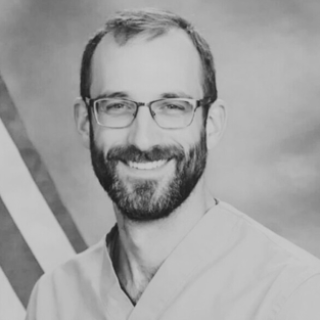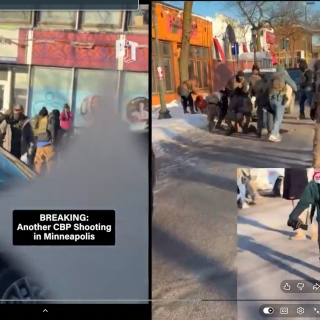This is “Fatimah,” not her real name (pictured above, her face not shown). She’s a young single mother with toddler children. She is quick-witted, charismatic, gracious and sober. But Fatimah and her kids reside just off Sullivant Avenue in a massive westside apartment community, which is a long-time hive for gang activity, addiction and violence.
Bags of “fenty” go for $10 here, but several addicts have told the Free Press they need four bags to get through the day to stave off becoming “dope sick.” Panhandling is their best means, they say.
The fentanyl epidemic comes in the wake of what was exposed in the now iconic “Dreamland: The true tale of America’s opiate epidemic.”When a tidal wave of black tar heroin, brought here by Mexican drug dealers, tore through Central Ohio as many (young white people) craved something stronger because their tolerance to prescription opiates kept growing. Legal pills in the tens-of-millions pumped into the community by the likes of Dublin-based Cardinal Health.
“Fatimah” on a recent late fall warm day was protesting outside the main office of her apartment complex. What she was protesting against is complicated – a modern psychological phenomenon called “Gangstalking” where individuals believe they are being targeted by groups who may or may not exist.
Mix deep-seated anxiety during a pandemic with a heavy dose of paranoia from living in a crime-riddled neighborhood, and this is what the community faces. A single mother on the verge of a mental crisis with toddler children in tow.
What isn’t helping is how Fatimah’s apartment complex seemingly has no regrets renting to drug dealers. And local broadcast news stations – especially WSYX Channel 6 – are no doubt also injecting fear into the single mothers who live in these neighborhoods with their constant “crime alert” megaphones.
“Targeted individuals, Gangstalking victims, I’m here now to say you need to start standing up for yourself,” said Fatimah in a recent online video post. “You need to put your insecurities aside. Put your fear aside. The mission is to break us. It’s time to stop hiding. It’s time to stop being scared. It’s time to stop trying to find every way to guard our home. It’s time to regain our freedom back.”
Stalked by gangs near Sullivant Avenue has several iterations, and one is a terrible reality that should not be mistaken for what Fatimah is dealing with, says Esther Flores, who takes care of Sullivant’s women addicts who have become “captured” by nearby trap houses.
“Unfortunately, it is real. We have Somalian men gang raping our girls and the punks at Carol Stewart doing the same at gunpoint. They come in all colors,” says Flores. “Then we have traffickers that come out of state to bring some girls and drop them on the westside and then take some of our girls with them.”
Fatimah is not an addict but struggling with mental health in an ongoing dystopian-ish pandemic world that was already dealing mental health and addiction crises.
In some ways, Fatimah is both a victim and her own offender. Can the community save her and her children?
“Our city is at a crossroads,” said Mayor Ginther during a late summer presser regarding the City’s 2022 budget, the largest ever, as it includes tens-of-millions in federal stimulus. “How we respond and recover from an unprecedented time in our history matters.”
During this same presser, the City announced something that can’t come fast enough for parts of the westside – a new ADAMH (Alcohol, Drug and Mental Health Board of Franklin County) crisis treatment center where, as they put it, “The center will offer a no wrong door philosophy to ensure anyone who arrives at the center receives services.” With funding from state, county, and city, the $50 million Franklin County Mental Health and Addiction Crisis Center is scheduled to break ground in 2022 on a grassy lot near Harmon Avenue.
There are resources for single mothers outside of ADAMH if they are willing and able to access them, and all needed. In Franklin County, one of three households are headed by woman, and the poverty rate for them double that of all other households, this according to a recently released COVID-19 recovery study by both Columbus City Council and the Franklin County Board of Commissioners.
But when single mothers face a crisis, they are most likely to turn to the police, who are overburdened and dealing with their own mental-health stressors on the westside to begin with. This past fall Fatimah did just this, and how the City and police handled her call stresses the need for a different response to Fatimah’s call for help.
The Free Press could not corroborate her story because Columbus police rarely respond to our emails, but Fatimah went to a corner store with her children this past September, and a young male, she claims, snuck up behind her and snatched a small amount of cash, believed less than $20, from one of her pockets.
“I (called police) and waited hours and no one came nor did anyone do an investigation,” she wrote in a text to the Free Press. “Once it got past 1am, I decided to just wait till daytime to give them another call. Daytime came and I then made the next call to see why officers still did not show and if they were able to be sent out to properly document my report then finally, they came! When officers arrived, I opened my door and was surprised to find that it was completely vandalized and tarnished with eggs, sugar, cheese, oil, plastic bags and my peephole was damaged. At this point I was in great fear for the safety of me and my children.”
She asked both officers to take a police report.
“But they refused, stating that I should move and that they would not take one,” she said. It should be noted the Columbus Division of Police does not take reports for the amount allegedly stolen from her.
Nevertheless, could a different approach have helped Fatimah? Less policing, more therapeutic intervention? These are complicated questions, but there are programs now in place to assist those who arguably are in greater need of a social worker and not an officer.
Indeed, the City and the Division of Police this past summer implemented a pilot program called “Alternative Response Program is the Right Response Unit,” which Mayor Ginther recently said was a success.
The pilot program began in June and is still up and running, confirmed a City spokesperson. Keep in mind Fatimah called Columbus police in September. Given $5 million to fund, the program puts social workers and mental health specialists from Columbus Public Health with 911 dispatchers.The Department of Public Safety reported for June and July there was a 62 percent reduction in the number of calls needing a police response.
“Instead of a traditional police or fire response to every call, this program identifies the specific needs of the caller, whether it’s mental health support, addiction services, or other social service needs, ultimately providing the caller with the most appropriate available resource,” stated Department of Public Safety spokesperson Glenn McEntyre in an email to the Free Press. “For calls that still require a traditional police or fire response, the Alternative Response professionals have been able to de-escalate volatile situations and provide pre-arrival instructions before officers or paramedics arrive at the scene.”
McEntyre continued, “When it comes to the physical response to scenes and calls for service, CPD has the Mobile Crisis Response unit, which includes a Crisis Intervention-trained police officer along with a mental health clinician. The teams respond to all types of crises, including suicidal persons or any other mental health emergency. This program started in June of 2018.”
These programs should be positive steps towards the community’s need, and the Mayor’s efforts, for a “Comprehensive Neighborhood Safety Strategy.”
“We cannot arrest our way out of crime, we must address the root causes as well,” said Mayor Ginther during his 2022 budget presser. “The updated Comprehensive Neighborhood Safety Strategy utilizes a community-wide, data-driven approach to reduce crime and enhance safety, including the expansion of our successful Alternative Response Program.”
But when it came to Fatimah, she alleges the only advice Columbus police had for her was “to move.” Which for her, may be impossible financially.
No doubt the City is taking some action to save Sullivant Avenue and the neighborhoods connected to this artery which has seen better days. A new police substation is in the works, as the City is seeking to purchase land between Columbian and Townsend avenue.
Hopefully the City and the Columbus Division of Police’s new Sullivant Avenue substation will embrace “community policing, which is crucial to bridging the divide between community and law enforcement,” stated the Mayor.
If anything, this continuous shift to modify police and community tactics is worth a try for Sullivant Avenue.
More recently the Free Press reached out to Fatimah to check on her well-being, but her phone was disconnected.



